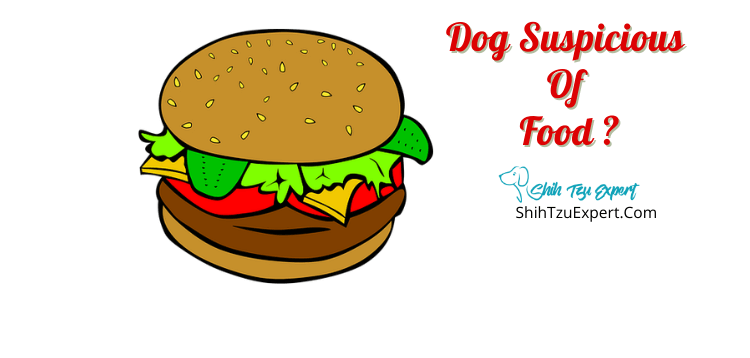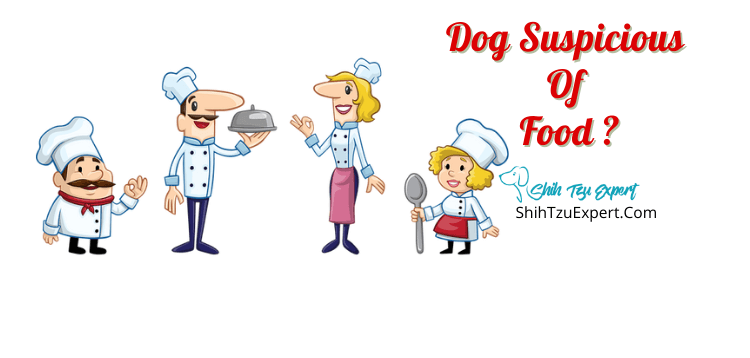Have you noticed that your dog’s eating habits seem to have changed? Or that they have been acting strangely at mealtimes? Whether they have become frightened of their food, or simply seem to have lost their appetite, here are some of the possible causes of this and what you can do to help.
Why Is My Dog Suddenly Suspicious Of Its Food?
Whether your dog is old or young, monitoring the amount of food and water they consume is an important part of being a responsible pet owner. If you notice that your companion isn’t eating or drinking, there are a couple of things that you can try to rule out any behavioral conditions. However, if their reluctance to eat or drink continues for more than a day or two, it is very important that you contact your vet, especially if you notice additional symptoms such as lethargy, vomiting and diarrhoea, or constipation.

Is This Behavioral Or Medical?
If your dog has begun acting strangely towards its food, it could be down to a medical or a behavioral problem. Behavioral problems can happen after the dog has been frightened or hurt by something while they were eating, meaning that they may be reluctant to go near their bowl again. If this is the case, feeding your dog in a room on their own when they won’t be disturbed by noise may help to ease their anxiety.
There are also lots of medical conditions that can cause your dog to lose its appetite or act differently towards its food. If their reluctance to eat continues, it’s important that you take your pet to the vet to rule out anything serious. If your dog has other symptoms, such as lethargy, vomiting, and diarrhea, or constipation, it is better to take your dog in for a check-up as soon as possible.
Why Is My Dog Sniffing Food But Not Eating?
If your dog sniffs its food without then taking a bite, it might be a sign that the food has gone bad. Dogs have a much better sense of smell than us, so your dog may be able to smell mold that is invisible to our eyes.
If this is the case, try giving your dog something else, like their favorite treat. If they eat this, then you know the problem is with their food. If they still sniff and walk away, then they may not feel too well and a trip to the vet is necessary, especially if this continues for more than a couple of days.
Is It Ok If My Puppy or Older Dog Skips A Meal?
Just like us, it is okay to occasionally skip a meal every so often. With puppies, they must get enough energy from their food to grow and develop, so try to encourage them to eat and monitor how often they refuse their dinner and go to your vet if it happens often.
For fully grown dogs, skipping meals isn’t usually too much of a problem as they don’t need so much energy but if you notice it happening often, they may need to have a check-up.
Why Does My Dog Back Away From Its Food Bowl?

If your dog seems afraid of its bowl, it might be because something frightened your dog while it was eating. Like with humans, dogs are nervous about things that have scared them in the past, so they may be frightened to go near their bowl if it frightened them once before.
This can often happen if the bowl tipped over while they were eating, making a loud bang, or if your dog is a rescue, they may have been harmed while using the bowl. Try to show them that eating is safe and that nothing frightening will happen to them while they eat. This can be done by allowing them peace and quiet at mealtimes and giving them as much time as they need to eat their food.
Why Is My Dog Suddenly Suspicious Of Treats?
Dog’s noses are between 10,000 and 100,000 times more powerful than ours, meaning that they can smell lots of things that we can’t. If your dog suddenly doesn’t like the smell of its favorite treats, then they may have gone bad.
Like with the bowl, it could also mean that your dog has had a frightening experience while taking treats, so try some positive reinforcement to show them that treats are good things!
Why Do Sick Dogs Become Suspicious Of Food?
Like us, when dogs are sick they may not feel like eating. Sometimes eating when you’re sick can only make you feel worse, lots of dogs will avoid food until they feel better.
If this problem continues for more than a day or two, then a vet visit is required to see what the problem might be.
My Dog Won’t Eat Unless Someone Pretends To Steal His Food
For some dogs, this kind of ritual can be a bit of a game: they may enjoy the playfulness or the attention that this behavior brings.
For other dogs, particularly rescue dogs, this kind of behavior comes from the need they feel to resource guard, meaning that they won’t feel the need to eat their food right away unless they feel that their food source is threatened. This kind of behavior should not be encouraged, and instead, their food should simply be left out until they realize that no one is going to take it from them.
Most healthy dogs won’t starve themselves, meaning that they will eventually come round to the idea of eating their food.
How To Find Out Why Your Dog Is Suspicious Of Food & Not Eating?
If your dog is reluctant to eat, there are a couple of things you can try to find out what the problem might be:
- Try a fresh bag of food: if the food smells off to your dog, they often know better than to eat it. Opening a fresh bag will rule out whether the problem is mould.
- Try a different food: like humans, sometimes dogs simply don’t like the taste of the food they’re given. Trying a different food will allow you to see whether this is the problem.
- Try your dog’s favourite treats: if you have tried fresh food, and a new type of food and your dog still won’t eat, the next thing to do is to see if they’ll still eat their favourite treats. If they still refuse, then it is likely that your dog isn’t feeling well and needs a trip to the vet.
- Try feeding your dog in a room on its own: if your dog appears frightened of their food, then they may feel too unsafe to eat. Try putting your dog in a quiet room alone with their food to see if they’ll eat it when they’re relaxed.
Why Do Dogs Lose Their Appetite?
Dogs can lose their appetites for a number of reasons, some of them may be easily fixed, while others may need medical attention. Here are some of the most common reasons why dogs lose their appetite:
- They feel unwell: If your dog hasn’t eaten its food for a day or two and isn’t acting their normal selves, then your dog might be sick. Taking your dog to your vet is the best thing you can do for your dog in this situation to get them back to feeling their normal, hungry selves.
- They may have tooth disease: if your dog appears interested in food but won’t eat, then it may be that their teeth are sore from dental disease. Try feeding some soft, wet food and make an appointment with your vet for a dental exam.
- They don’t feel safe: if your dog is in an unfamiliar environment, or has been recently adopted, then your dog may not feel safe enough to eat. Give it some time to see if they relax, but if the problem persists when they’re back in a familiar environment, then it may be time for a health check.
- They may be fussy: dogs can sometimes get bored of their food, or not like the new food that you are giving them. Try them with something different, or return to their original food, to see if the problem goes away.
- There is another dog in the house: if you have other dogs in the house, then one of your dogs may not eat if it is at the bottom of the pecking order. Some dogs will show submission by leaving the food for the alpha dog, so feeding all your dogs in different spaces may resolve this.
How To Solve Loss Of Appetite In Dogs
If your dog seems to have lost its appetite, here’s a list of simple things you can try:
- A fresh bag of food: this will tell you whether the problem is mould
- A different type of food: your dog may have become bored of its normal diet. Changing the food will add some variety
- Try feeding wet food: if your dog eats this then the problem may be dental-related, and a dental checkup is needed
- Feed your dog in a quiet room on its own: sometimes dogs will only eat if they feel safe enough to do so, and not threatened by any other pets they may have in your home
- Feed your dog their favorite meal: if all else fails, try making your dog its favorite food. Don’t give them anything too fatty, however, as this can sometimes make the problem worse.
- Take your dog to the vet: if your dog hasn’t eaten for more than a day, then the next step is to take it to the vet. They will be able to tell you why your dog might not be eating, and give you something to fix the problem.
My Dog Is Not Eating And Not Drinking?
If your dog is not eating or drinking, then it needs immediate veterinary attention. Puppies can become dehydrated very quickly, so it’s important to monitor for any signs that they aren’t drinking.
My Dog Eats But Won’t Drink Water?
If your dog is eating but not drinking, it could be for a number of reasons. The least worrying of these could be that your dog is simply in a new environment, and doesn’t like the taste of the new water. It could also be that you have bought your dog a new bowl and they are a bit suspicious of the change.
More worryingly, it could also be a sign of a medical condition: animals with rabies refuse to drink water so it’s important to monitor for any other symptoms.
If your dog seems well but isn’t drinking their usual amount, then try adding some liquid to their food: simply adding water to dry food can create a gravy that dogs often enjoy, and it’s a great way to increase their fluid intake. If your dog continues to avoid water for more than a day or two then a vet visit is needed.
Making sure that your dog eats and drinks the correct amount is an essential part of taking care of a pet, and the best way to ensure that your dog lives a long and happy life with you by their side.
Helpful Links:
https://www.petmd.com/dog/general-health/why-my-dog-not-drinking-water
https://www.vets-now.com/pet-care-advice/my-dog-wont-eat/

![Best Cheap Dog Foods - our Top 10 Picks of High Quality Brands That Are Still Affordable [Under $1 per pound!] in 2023 Best Cheap Dog Foods - our Top 10 Picks of High Quality Brands That Are Still Affordable [Under $1 per pound!] in 2023](https://shihtzuexpert.com/wp-content/uploads/2018/01/Best-Cheap-Dog-Food-Featured-image.png)
![10 Best Dog Crates for Separation Anxiety [High anxiety dog crates 2019 Reviews] 10 Best Dog Crates for Separation Anxiety [High anxiety dog crates 2019 Reviews]](https://shihtzuexpert.com/wp-content/uploads/2019/05/5-3.jpg)
![12 Best Dog Clippers for Shih Tzu [Fun & Easy Grooming] 12 Best Dog Clippers for Shih Tzu [Fun & Easy Grooming]](https://shihtzuexpert.com/wp-content/uploads/2017/04/Best-Dog-Clippers-for-Shih-Tzu-1.png)
